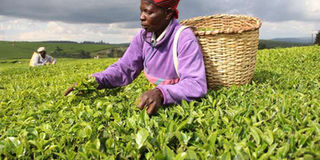Tea farmers get greenlight to directly export their produce

A tea estate employee picks tea leaves at the Nandi Tea Estate Limited, Nandi Hills. Agriculture Cabinet Secretary, Willy Bett has given a directive that tea companies and farmers’ organisations can directly seek external markets for their tea crop without going through middlemen. POTO | JARED NYATAYA | NATION MEDIA GROUP
What you need to know:
- The new measures are aimed at protecting tea farmers from exploitation by unscrupulous middlemen.
- Some farmers in Western Kenya had threatened to quit tea farming and venture into other activities including commercial tree growing citing dwindling returns and exploitation.
- For the Kenyan tea to fetch high profits in the international markets, Mr Willy Bett directed all KTDA factories to install extra machines for value addition.
- Demand for herbal tea is high in some European countries and local farmers should take advantage of that too.
Farmers can now afford a smile after the government yielded to pressure allowing them to directly export tea and avoid brokers.
The majority of multi-national tea companies and small scale producers who used to sell their crop through the Kenya Tea Development Agency factories and counties, said the move was long overdue.
Agriculture Cabinet Secretary Willy Bett directed tea companies and farmers’ organisations to directly seek external markets for the cash crop without going through the middlemen at the Port of Mombasa. The brokers are accused of fleecing farmers.
There have also been claims that some brokers manipulate tea prices to the disadvantage of growers.
Mr Bett said the new measures are aimed at protecting tea farmers from exploitation by unscrupulous middlemen.
Tea prices at the Mombasa auction improved by a marginal two per cent in the last week of May marking the second consecutive rise after a losing streak in the previous sales.
A kilogramme on average sold at Sh214, up from Sh209 in the previous auction with the volume offered going up from 5.2 million kilos to 5.5 million.
The export move will come as a big relief to tea producers, companies and farmers’ groups, which have over the years been complaining that they are not getting value for their crop.
Mr Bett said the strict conditions and rules in which all tea companies were required to sell their products through the middlemen at the Port of Mombasa amounted to punishment and exploitation of producers.
STAMP OUT EXPLOITATION
“The government will not allow middlemen to continue swindling farmers of their hard-earned money. The traditional process of tea which is processed and parked at the factory level going through middlemen will not continue,” said Mr Bett.
He said the government has introduced several new measures to stamp out exploitation. The minister said brokers and greedy traders have been making more money than farmers.
The CS, who was addressing tea farmers at Kaptel SDA Church in Nandi County where he commissioned the growing of avocados, assured them that the government will not allow the sub-sector to go to the dogs.
“The tea industry generates billions of shillings yearly towards boosting the Kenyan economy. Action has already been taken to streamline the tea industry and ensure that millions of Kenyans who rely on the tea sector for income don’t suffer,” said Mr Bett.
Some farmers in Western Kenya had threatened to quit tea farming and venture into other activities including commercial tree growing citing dwindling returns and exploitation.
The move for direct export however comes against the backdrop of a standoff between multinational tea firms and county governments over renewal of land leases. Counties insist that the multinationals must cede part of their huge tracts of lands for community projects.
Major tea producers whose leases are set to expire have been forced to freeze their growth plans.
The 99-year leases are coming to the end and with no deal in sight tea companies in Nandi, Kericho and Bomet face uncertain future. More ominously, thousands of workers are at risk of losing their jobs while Kenya’s foreign exchange is bound to be hit hard.
ROOT OUT CARTELS
Mr Bett said the tea industry has created thousands of jobs adding that the Ministry of Agriculture will do all within its means to root out cartels in the tea industry.
He said the government is coming up with several measures to be announced this month and urged farmers not to abandon tea farming.
Mr Bett said that 95 per cent of Kenyan tea is exported while less than five per cent is consumed locally.
“Prices of tea in the world market keep on fluctuating. The government plans to start tea cottage industries to deal with the problems facing the sector,” said Mr Bett.
For the Kenyan tea to fetch high profits in the international markets, Mr Bett directed all KTDA factories to install extra machines for value addition.
“I’m asking all the 66 KTDA factories in Kenya to install extra machines for processing of tea on value addition to enable farmers get value of tea farming.
Demand for herbal tea is high in some European countries and local farmers should take advantage,” said Mr Bett.





